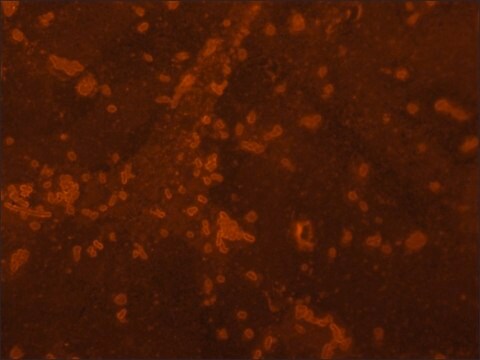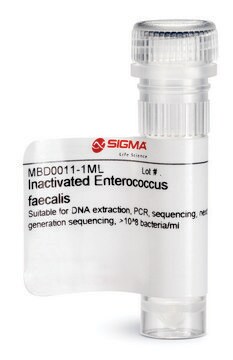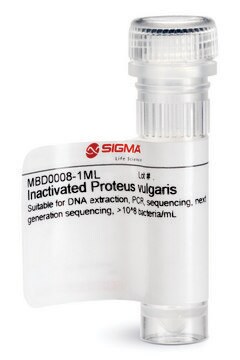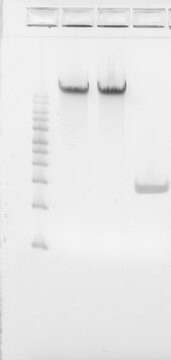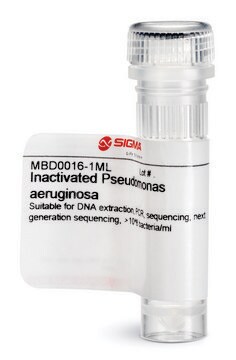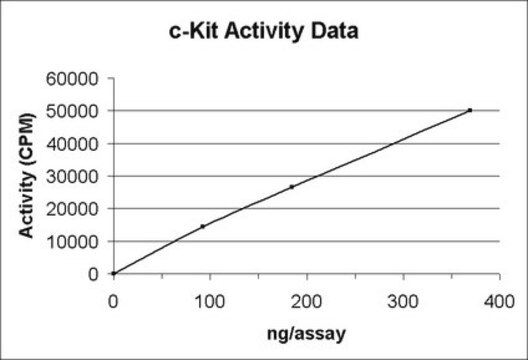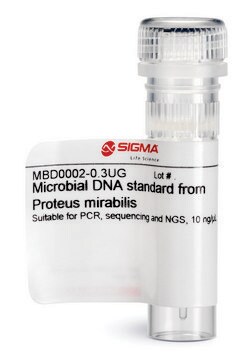MBD0007
Inactivated Proteus mirabilis
Suitable for DNA extraction, PCR, sequencing, next generation sequencing, >10^8 bacteria/ml
Anmeldenzur Ansicht organisationsspezifischer und vertraglich vereinbarter Preise
Alle Fotos(1)
About This Item
UNSPSC-Code:
41105500
NACRES:
NA.51
Empfohlene Produkte
Qualitätsniveau
Form
liquid
Konzentration
>10^8 bacteria/ml
Methode(n)
DNA extraction: suitable
DNA sequencing: suitable
PCR: suitable
Versandbedingung
dry ice
Lagertemp.
−20°C
Verwandte Kategorien
Allgemeine Beschreibung
Standardization of sample analysis is currently neededin microbiome genomics research workflow. Lack of standardization can lead tobiases and errors in common processes during sample preparation and analysissuch as sample amplification, sequencing and bioinformatics analyses.1 Inactivated Proteus mirabilis can serve as standard for benchmarking theperformance along the workflow of microbiomics or meta-genomics analyses and asa tool to increase reproducibility and allow comparison of results obtained bydifferent labs.
Proteusmirabilis is a gram negative facultative anaerobicrod-shaped bacterium. Bacteria of the genus Proteus of the familyEnterobacteriaceae are opportunistic human pathogens responsible for wound andburn infections as well as skin, eye, ear, nose, throat, urinary tract, andgastrointestinal infections and bacteremias.2 The most common infection involving P. mirabilis occurs when the bacteria, which is a memberof the natural intestinal flora, moves to the urethra and urinary bladder causingurinary tract infection. The outer-membrane lipopolysaccharide (LPS) isconsidered an important virulence factor of Proteus.3 Arabski et al. suggest that theimmunological response against P. mirabilis LPS might play a role in rheumatoidarthritis.4 A possible correlation between the abundanceof P. mirabilis in the intestine and obesity was suggestedrecently.5
Read here how to use our standards to ensure data integrity for your microbiome research.
Proteusmirabilis is a gram negative facultative anaerobicrod-shaped bacterium. Bacteria of the genus Proteus of the familyEnterobacteriaceae are opportunistic human pathogens responsible for wound andburn infections as well as skin, eye, ear, nose, throat, urinary tract, andgastrointestinal infections and bacteremias.2 The most common infection involving P. mirabilis occurs when the bacteria, which is a memberof the natural intestinal flora, moves to the urethra and urinary bladder causingurinary tract infection. The outer-membrane lipopolysaccharide (LPS) isconsidered an important virulence factor of Proteus.3 Arabski et al. suggest that theimmunological response against P. mirabilis LPS might play a role in rheumatoidarthritis.4 A possible correlation between the abundanceof P. mirabilis in the intestine and obesity was suggestedrecently.5
Read here how to use our standards to ensure data integrity for your microbiome research.
Anwendung
Inactivated bacteria are provided at >10^8 bacteria/ml concentration in TE buffer pH 8.0. It is recommended to avoid freeze thaw cycles of this product.
Suitable for Quantitative standard for PCR, Sequencing and NGS
Suitable for Quantitative standard for PCR, Sequencing and NGS
Leistungsmerkmale und Vorteile
- Individual microbial standard for microbiomics and meta-genomics workflow
- Suitable standard for PCR, sequencing and NGS
- Improve Bioinformatics analyses
- Increases reproducibility
- Compare results lab to lab
Physikalische Form
Liquid -The inactivated bacteria is provided at >10^8 bacteria/ml in TE buffer pH 8.0
Lagerklassenschlüssel
10 - Combustible liquids
WGK
WGK 2
Flammpunkt (°F)
Not applicable
Flammpunkt (°C)
Not applicable
Analysenzertifikate (COA)
Suchen Sie nach Analysenzertifikate (COA), indem Sie die Lot-/Chargennummer des Produkts eingeben. Lot- und Chargennummern sind auf dem Produktetikett hinter den Wörtern ‘Lot’ oder ‘Batch’ (Lot oder Charge) zu finden.
Besitzen Sie dieses Produkt bereits?
In der Dokumentenbibliothek finden Sie die Dokumentation zu den Produkten, die Sie kürzlich erworben haben.
Unser Team von Wissenschaftlern verfügt über Erfahrung in allen Forschungsbereichen einschließlich Life Science, Materialwissenschaften, chemischer Synthese, Chromatographie, Analytik und vielen mehr..
Setzen Sie sich mit dem technischen Dienst in Verbindung.